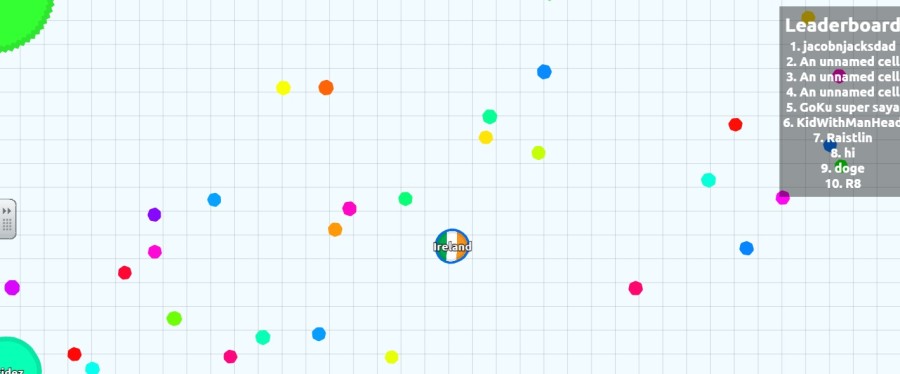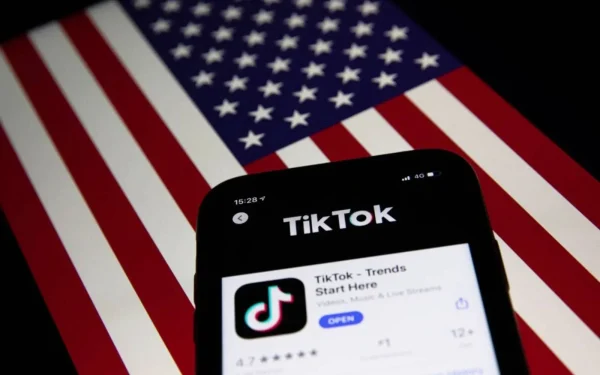Students’ Newest Gaming Obsession: Agar.io
An Agar.io screenshot showing the user, “Ireland,” surrounded by consumable circles.
Sometimes, students just need a break from the academic grind of each school day. When a 10-minute break and 25-minute lunch period just aren’t enough, some students turn to Agar.io. A web-based game that allows each user to act as a small circle or “cell” and absorb pellets and smaller cells (other users) to become the biggest cell on the server, Agar.io has been a big hit (or distraction, depending on your point of view) with students this year.
“It’s very addictive, because you want to become the best [player] on the server,” said eighth grader Christian Cassanelli.
It’s survival of the fittest as players are randomly placed in “rooms” or play spaces with other online users. The goal is to try to accumulate the most “mass” without being devoured by the competition. The more cells a user consumes, the larger (and slower) the cell gets, making the game both fun and challenging.
According to a blog on www.appannie.com, a website that offers analytics services for app developers, Agar.io was created by designer Matheus Valadares, who first launched the Java-based game among popular online communities such as 4chan and Reddit in April of 2015. It was through these sites that Agar.io’s notoriety grew. It’s now an app for iOS and Android devices, and it didn’t take long for the craze to come to The Benjamin School.
“It is very fun and exciting [because] when you get big and die, you always want to try again,” said seventh grader Anthony Cavallo, referring to when your cell gets eaten by another cell. “It is very addicting and sometimes you rage and get mad at the computer, but [in] the end you have a great time!”
Part of the fun comes from the ability to name your cell and choose your cell’s avatar or “skin.” Some skins are pre-loaded depending on the name you choose. For example, typing in “Mexico” as your name will automatically give your cell a Mexican flag skin.
In addition, players can split their cells to attack others or to make a desperate escape. However, once a player is consumed, the game’s over.
According to appannie.com, despite being released as an app in July, Agar.io has remained a top-ranking game in over 40 countries, including the US, Australia, Canada, and the United Kingdom. Also, “from July 7 – July 22, 2015, the game was the #1 download on iPhone and featured multiple times in the Best New Games categories for the US, Canada, Brazil and Turkey.”
Some students see the game as a waste of time rather than an entertaining break from the day. “There’s no point to [the game],” said sixth grader cameron Salehi. “All you do is try to eat other circles.” Benjamin’s administrators and teachers may wish more students felt that way about the game.
“If it’s not an educational game it should not played in class,” said History Department Chair Mr. Marshall Mullnix. “Students should not play Aagar.io in school if they vaule their education.”
Some of the teachers and administrators are aware that students enjoy playing the game, but they caution students about playing Agar.io, or any other online games, during class without teacher permission. “If they are breaking the acceptable use policy, they should not be playing it in class,” said Mr. Matthew Morrow, a member of Benjamin’s Technology Department, “but it is the teacher’s decision, and their rules should be respected.”
Playing the game in class is indeed a violation of the School’s acceptable use policy (AUP) if teacher permission has not been granted. Any student who violates the AUP is subject to anything from a green slip to expulsion depending on the severity of the infraction.
“I have not seen [students] play Agar.io during class…but they have signed an honor code pledge, they signed an acceptable use policy,” said Head of Middle School Mr. Charles Hagy. “It will affect their grade. The policies mean educationally appropriate. It means using [that kind of] technology in class only hurts the student.”
There’s no doubt many students value their education, especially one as rich, rigorous, and expensive as Benjamin’s, but they also value what little free time they have during the school day. If a student can spend the first two minutes of class getting his gaming fix via Agar.io, he just might do it, regardless of the consequences.






zachary bradley • Nov 3, 2015 at 4:53 am
I love this game, i was play it at K10 Games